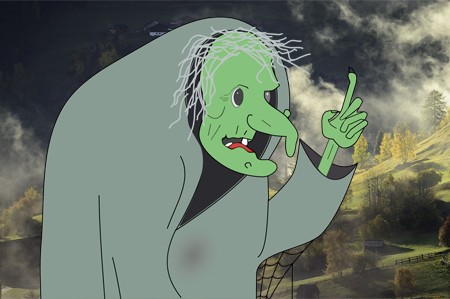Test di comprensione
Leggi il dialogo
C’era una volta una strega buona. Nelle favole le streghe sono spesso cattive, ma la strega Genoveffa era buona.
Purtroppo Genoveffa era anche molto brutta.
« Ricordo quando ero una bella principessa, prima dell’incantesimo, e tutti erano miei amici. Eravamo così felici nel villaggio» – pensava Genoveffa.
Ma adesso nessuno era tranquillo. Erano spaventati.
E i bambini non erano più allegri come prima.
Genoveffa era triste perché la gente la giudicava solo per il suo aspetto.
Per fortuna, non era per tutti così…
▻ c’era una volta: once upon a time
Literally: there was once…
This is how all Italian fairy tales begin. Era is the imperfetto tense of the verb essere (to be) that we’ll learn in this lesson.
▻ purtroppo: unfortunately
▻ ricordo: I remember
Ricordare: to remember; to remind.
Ricordarsi: to remember.
Both the reflexive and the non-reflexive version of this verb mean to remember and you can use either of them, because there’s no real difference in their meaning:
- Ricordo quando era giovane: I remember when she was young
- Mi ricordo quando era giovane: I remember when she was young
We can only use the verb ricordare, though, if we mean to remind:
- Ti ricordo che devi pagarmi: I remind you that you have to pay me.
▻ principessa: princess
In a royal family, we can find:
- il re: the king
- la regina: the queen
- il principe: the prince
- la principessa: the princess
▻ prima dell’incantesimo: before the enchantment
Prima is followed by the preposition di when it means before something:
- prima della pioggia: before the rain
When prima is used as an adverb of time, it’s not followed by a preposition and in this case it’s translated as first or earlier:
- prima mangiamo e poi usciamo: first we eat and then we go out
- l’ho visto prima: I saw him earlier
▻ villaggio: village, small town
▻ pensava: she used to think, she thought
This is the imperfetto tense of the verb pensare. We’ll learn all about it soon.
▻ tranquillo: calm, relaxed
▻ spaventati: scared, frightened
spaventare: to scare, to frighten
spaventarsi: to get scared
▻ i bambini non erano più allegri come prima: kids were not as cheerful as (they were) once anymore
In this context prima can be translated as once and it refers to the good times before the enchantment.
▻ la gente: people
In Italian la gente is always singular:
- la gente parla troppo: people talk too much
▻ la giudicava: used to judge her
Giudicare: to judge.
Giudicava is the imperfetto tense of this verb.
▻ per il suo aspetto: for her looks; based on her looks
▻ per fortuna: luckily
▻ non era per tutti così: it wasn’t like this for everyone
Così means so before an adjective:
- È così intelligente: he’s so smart
but it can also be translated as like this, this way after a verb:
- Parla così: he talks this way
Ascolta di nuovo la storia e completa il testo con le parole mancanti.
Listen to the story again and complete the text with the missing words.
If you have any questions or doubts, leave a comment below.



